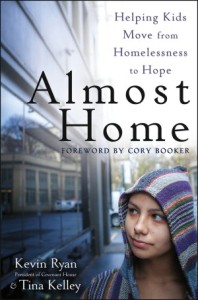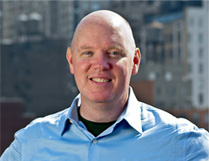August Heroes of the Month – Kevin Ryan and Tina Kelley
In July, I attended the American Bar Association‘s Conference on Children and the Law, and I am glad that I did because I got to hear two foster heroes give the keynote presentation. Kevin Ryan is the president of Covenant House International, which helps 56,000 at-risk and street youths in over 20 cities in six countries. He wrote the moving book Almost Home: Helping Kids Move from Homelessness to Hope with award-winning writer at Covenant House Tina Kelley.
Kevin and Tina were kind enough to answer some questions for us.
- What inspired you to write the book Almost Home?
Kevin: “Binnie” was the first young person I ever worked with when I first worked at Covenant House, as a lawyer for street kids. The police brought her to us after she had been living in Kennedy Airport for a week, eating out of trash cans. She had run away from a brutal childhood – her aunt kept her from going to school, made her do all the housework, and sent her to be raped over and over again by a neighbor boy. She was totally dejected when she arrived at our shelter.
Fast forward a few years, and I ran into Binnie at a diner, where she was a waitress. She looked happy, and stood about 4 inches taller somehow. She was putting herself through nursing school, dating a young man from church who loved her in the right way. She eventually married him, had three kids, and became a head nurse in a neonatal intensive care unit of a New Jersey hospital. Her story blew me away—how does a person go through such a transformation, after such challenging beginnings? I wanted to let everyone know the power of the changes that can happen when kids start believing themselves, after receiving unconditional love and respect. It’s their right, and our privilege to provide that.
Tina: When I was a newspaper reporter, I had always wanted to write a book. I used to volunteer at Covenant House in the late 1980s, and had the utmost respect for its work. When Kevin said he was looking for a co-author, to tell the stories of a handful of homeless young people, it was a dream come true.
2) Was it difficult to find young people willing to share the stories of their difficult lives? Why do you think these six came forward?
Tina: Some of the young people we approached did not want to go through the arduous process of being interviewed and answering countless follow-up questions. It was a big sacrifice for the six people we worked with, to tell their stories, and dig up all those unpleasant experiences and emotions. But they were incredibly gracious and generous with us. We are in their debt.
Kevin: Several of the people we interviewed felt it was their mission to get their stories out into the world. “Muriel,” the sex trafficking survivor in Vancouver, was adamant that people hear her story, so if they felt trapped in a similar situation, they could believe that it was possible to escape. Many of the kids we worked with are rightfully proud of their accomplishments, and want to encourage other homeless or disadvantaged young people to feel hopeful about their futures.
3) During your talk at the Conference on Children and the Law, you mentioned alarming statistics on homelessness and trafficking. Why do you think these problems have gotten so huge? What do we need to do to stop these problems?
Tina: Homeless young people work hard to remain invisible, to keep themselves safe from predators. Sex trafficking victims are kept hidden away, and moved frequently, specifically so they won’t be able to seek help. Gradually, people are becoming aware of the plight of these under-the-radar kids, but they have grown in number due in part to their invisibility, in part to challenging economic times, and in part to breakdowns in family relationships.
 Kevin: Our book, Almost Home: Helping Kids Move from Homelessness to Hope, has an entire chapter on what we can do to fight youth homelessness and sex trafficking. Covenant House’s website, AbolishChildTrafficking.org, has ideas for how you can get involved. In short, we need people to join our movement to help protect homeless and vulnerable youth. We need changes to the foster care system so kids don’t age out of foster care without families, and quickly become homeless. We need changes to our legal system so that prostituted children are not treated as criminals, but given opportunities for the bright futures they deserve. We need to step up and mentor kids so they know they are valuable and cared for.
Kevin: Our book, Almost Home: Helping Kids Move from Homelessness to Hope, has an entire chapter on what we can do to fight youth homelessness and sex trafficking. Covenant House’s website, AbolishChildTrafficking.org, has ideas for how you can get involved. In short, we need people to join our movement to help protect homeless and vulnerable youth. We need changes to the foster care system so kids don’t age out of foster care without families, and quickly become homeless. We need changes to our legal system so that prostituted children are not treated as criminals, but given opportunities for the bright futures they deserve. We need to step up and mentor kids so they know they are valuable and cared for.
4) Your affection and dedication for the children who come to Covenant House was obvious during your talk. It must be difficult to see how their rough lives have impacted them. How do you deal with that?
Kevin: It was difficult, but we came away feeling inspired by all they had become. They are, in many cases, in loving relationships, even becoming loving parents, breaking the patterns they’d grown up under. We also worked hard to develop understanding and compassion for their families, who were battling demons of their own.
Tina: It was so important to get their stories out into the world, that we couldn’t fall apart on the job. I’d have a good cry when I needed to, but knew how important it was to keep up with the work and live up to the kids’ expectations for the book.
5) What advice do you have for youth who need help but haven’t found a resource like Covenant House?
Tina: Keep yourself safe. Believe in yourself. Don’t listen to the naysayers. Get help from a teacher, or a trusted adult. You can also call 1-800-RUNAWAY or visit www.1800runaway.org.
6) What is your advice for the social service workers and counselors who work with these children? What do these children need? How can they reach the children?
Kevin: First of all, bless you for taking on this challenging, potentially life-saving work. Take care of yourself and lift up and encourage your co-workers, because you will need all the strength you can get. As for the kids, they need unconditional love and respect. They need to know that people care and are trustworthy. They need to be convinced about how bright their futures can be. And they need to know that society as a whole cares about them. We can all contribute to our movement to help vulnerable kids achieve their full potential.





